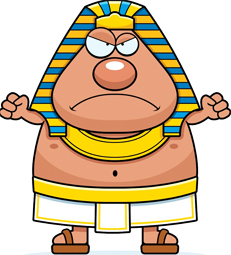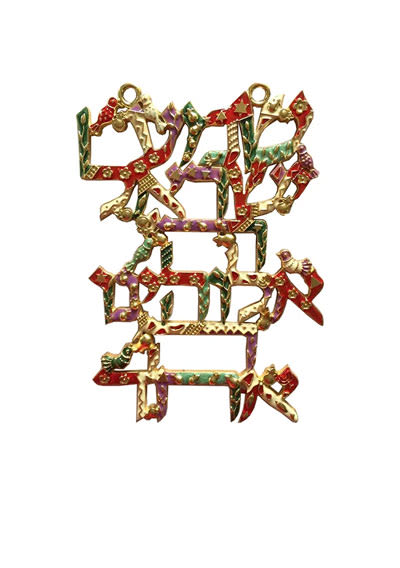
Va’eira: Whether They Like it or Not
How can Rebbe Nachman say that there's no bad in the world? Didn't he know about Pharaoh and all the other tyrants throughout history?

"However, for this have I let you endure …so that My Name may be declared throughout the world" (Exodus 8:1).
Once again, Moses appears before Pharaoh, before the hail – the seventh plague. He tells Pharaoh that the latter should have been dead by now, but Hashem has allowed Pharaoh to live for two big reasons: first, so that the world would see Hashem's power; and second, so that Hashem's Name would be sanctified around the globe…
Throughout history, we encounter tyrants of the worst sort, whose aspired to revolt against Hashem and to uproot His chosen people Israel. Although they succeeded in enslaving, persecuting and spilling the blood of our brothers and sisters, ultimately, they have not only fallen but have been wiped off the face of the earth. Even more so, the tyrants – unwittingly, whether they like it or not – have been conduits for the sanctification of Hashem's holy Name. They've done a much better job in publicizing Hashem, His power and His glory than any leading wire service or broadcasting network could ever do.
 Take Pharaoh for example: his continued refusal to free the Jewish People triggers more and more plagues, one worse than the other. The ultimate miracle that Pharaoh “merited” in invoking was the splitting of the Red Sea when he chased after the Jewish People because of his almost-immediate regret in freeing them. How do we know that the whole world knew what happened to Pharaoh and the Egyptians? Rahav says to the two spies whom Joshua sent on a recon mission to Jericho, “We heard how Hashem dried the waters of the Red Sea in your behalf when you left Egypt, and what you did to the two Amorite Kings in Transjordan, to Sichon and to Og.[1]” The Amorite kings, especially Sichon, were considered invincible. Hashem proved otherwise. With no newspapers, no news websites, no email, Twitter or news feeds, the news of Hashem's miracles makes the rounds. Once kings Sichon and Og are routed, the prophet continues to tell us about how the news affected our enemies: “When all the Amorite kings and all the Canaanite kings heard that Hashem dried the waters of the Jordan before the Israelites as they crossed over, their hearts melted…”[2]
Take Pharaoh for example: his continued refusal to free the Jewish People triggers more and more plagues, one worse than the other. The ultimate miracle that Pharaoh “merited” in invoking was the splitting of the Red Sea when he chased after the Jewish People because of his almost-immediate regret in freeing them. How do we know that the whole world knew what happened to Pharaoh and the Egyptians? Rahav says to the two spies whom Joshua sent on a recon mission to Jericho, “We heard how Hashem dried the waters of the Red Sea in your behalf when you left Egypt, and what you did to the two Amorite Kings in Transjordan, to Sichon and to Og.[1]” The Amorite kings, especially Sichon, were considered invincible. Hashem proved otherwise. With no newspapers, no news websites, no email, Twitter or news feeds, the news of Hashem's miracles makes the rounds. Once kings Sichon and Og are routed, the prophet continues to tell us about how the news affected our enemies: “When all the Amorite kings and all the Canaanite kings heard that Hashem dried the waters of the Jordan before the Israelites as they crossed over, their hearts melted…”[2]
Joshua himself explains to the Israelites before they begin the campaign to conquer the Land of Israel why Hashem does such wonders and miracles against our enemies, “So that all the people of the earth will know the hand of Hashem for it is mighty, and so they shall fear Hashem our G-d all the days.”[3]
The wicked Nimrod held the “distinction” of being the first king to revolt against Hashem and to try to kill Hashem's chosen son Abraham, the first monotheist and the first Hebrew. Abraham, with a mere 318 soldiers[4], defeated Nimrod and his allies, the mightiest army on earth then. Pharaoh failed to learn from Nimrod, and had to learn the hard way. So did Haman and many who followed him.
Don't think that Hashem's miracles were just something of ancient times. The Six-Day War of 1967 was a miracle that dazzled the earth. Nasser of Egypt, together with Hussein of Jordan and Hafez el Assad, decided to “throw the Jews into the sea.” In May of 1967 as they encircled Israel like a tightening noose, the entire world thought that the Jewish people in the Land of Israel would soon be wiped out, Heaven forbid. So much so, that the Arabs were already parceling off the Land of Israel – Egypt would get Tel Aviv, Syria would get Haifa and Jordan would get Jerusalem. When the smoke of Israel's lighting preemptive strike cleared, following six days of bitter hand-to-hand fighting, the tables were turned: rather than the Jews being thrown into the sea, they captured Sinai from Egypt, Judea-Samaria and East Jerusalem from the Jordanians and the Golan from the Syrians.
What do we learn from all this? Our sages teach that Hashem creates everything in His own honor. In other words, as the holy Rebbe Levi Yitzchak of Berditchev says, we are all agents of sanctifying Hashem's holy Name. One way or another, whether we like it or not, we will all do Hashem's will and publicize His Name in the world. The question is, whther we will do it out of righteousness like our holy tzaddikim, or out of tyranny and evil like our oppressors. The choice is ours.
[1] Joshua 2:10
[2] Ibid, 5:1
[3] Ibid, 4:24
[4] The Midrash cites that “318” is the numerical equivalent of the name “Eliezer”, Abraham's servant, and says that Abraham fought Nimrod and his allies with Eliezer alone.







